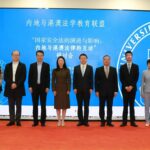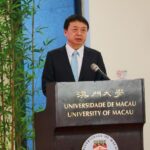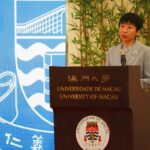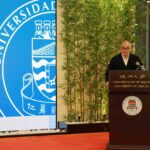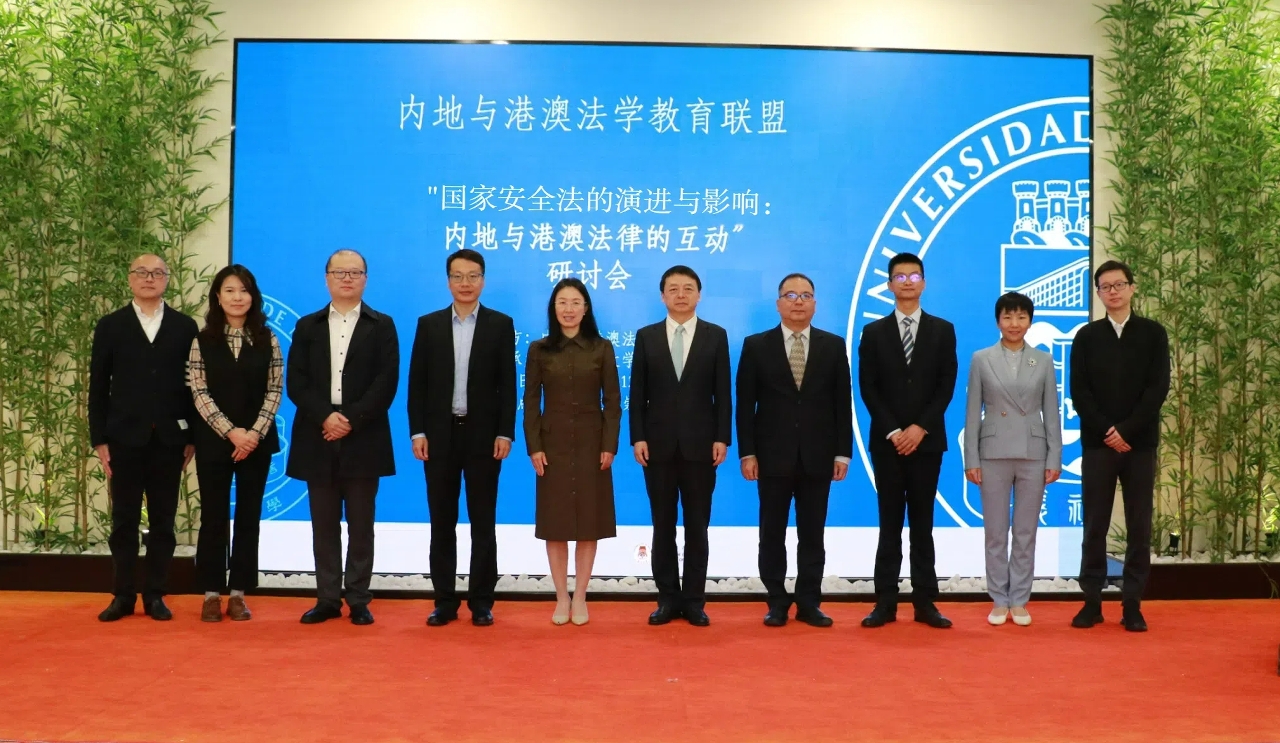 The opening ceremony of the seminar
The opening ceremony of the seminar
The seminar titled ‘The Evolution and Impact of National Security Law: The Interaction between China Mainland and Hong Kong-Macao Legal Systems’, hosted by the Faculty of Law (FLL) of the University of Macau (UM), was held at UM. The event brought together nearly 40 legal experts from mainland China, Hong Kong, and Macao to discuss the development of national security law and its significance for legal practice in the Guangdong-Hong Kong-Macao Greater Bay Area.
The opening ceremony featured speeches by Ma Huaide, president of China University of Political Science and Law; Zhang Jing, first-level inspector of the Office of Hong Kong, Macao and Taiwan Affairs of the Ministry of Education; and Tong Io Cheng, dean of UM FLL. Also present were Wang Jianyuan, deputy director and first-level inspector, Pan Baoliang, division chief and first-level inspector, of the Department of Law of the Liaison Office of the Central People’s Government in the Hong Kong SAR; Liu Jiahui, second-level inspector, and Gao Zhen, division chief, of the Department of Law of the Liaison Office of the Central People’s Government in Macao SAR; Bie Zhi, division chief, and Wu Jun, deputy division chief, of the Research Office of the Hong Kong and Macao Basic Law Committee of the Standing Committee of the National People’s Congress; and Song Pei, deputy division chief of Bureau VIII of the Hong Kong and Macao Work Office of the CPC Central Committee.
The seminar consisted of three sessions. The first session was chaired by Xiong Wei, dean of the Law School at Shenzhen University. Qin Guanying, associate dean of the School of Judicial Police at Gansu University of Political Science and Law, gave a keynote speech on the legislative evolution of national security law. Tu Kai, associate professor in the School of Law and deputy director of the Office of Legal Affairs at Tsinghua University, proposed a new analytical framework on the interaction between the laws of mainland China, Hong Kong, and Macao. Guo Tianwu, professor in the School of Law and director of the Hong Kong and Macao Basic Law Research Center at Sun Yat-sen University, discussed in depth the application of the certificate system in cases involving national security. The session concluded with comments from Chen Baifeng, dean of the School of Law at Zhongnan University of Economics and Law, and Zhu Jie, deputy dean of the Law School at Wuhan University.
The second session was chaired by Li Xiang, vice dean of the Law School and vice director of the Institute of ‘One Country, Two Systems’ and Basic Law at Jinan University. Yao Guojian, associate dean of the School of Law of China University of Political Science and Law, delivered a keynote speech on the relationship between the Hong Kong National Security Law and the Basic Law. Zou Pingxue, director of the Center for Basic Laws of Hong Kong and Macao Special Administrative Regions at Shenzhen University, gave a speech on the establishment of a sound legal system for safeguarding national security in Hong Kong. Wei Leijie, associate professor in the School of Law at Xiamen University, analysed the legislative features and future outlook of the Hong Kong National Security Law. Xiao Huina, assistant professor in the Department of Law and Business at Hong Kong Shue Yan University, provided an in-depth analysis of the judicial application of Hong Kong’s Safeguarding National Security Ordinance. Lau Shan, lecturer in the Faculty of Law at the University of Hong Kong, presented a special report on the impact of the Hong Kong National Security Law on disclosure obligations in Hong Kong’s family proceedings. Xue Wenchao, assistant professor in the Faculty of Law at Macau University of Science and Technology, discussed the interaction between the criminal provisions of the Macao National Security Law and the framework of criminal law. Emeritus Professor Lok Wai Kin and Research Assistant Professor Lai Kuan Ju in UM FLL presented on the empirical and optimisation aspects of systematic national security education in Macao. The session concluded with comments from Tu Kai and Liu Renwen, researcher at the Institute of Law of the Chinese Academy of Social Sciences.
The third session was divided into two parts. The first part was chaired by Zhao Jun, executive vice dean of Qiushi College at Zhejiang University. Zhu Jie delivered a keynote speech on ‘The Status Quo and Problems in Teaching National Security Law’. Yang Liu, professor in the Criminal Justice School at Zhongnan University of Economics and Law, gave a detailed account of the nature and characteristics of criminal law provisions in the Hong Kong National Security Law. The first part concluded with comments from He Zhipeng, dean of the School of Law at Jilin University, and Zhu Xiaoqin, vice dean of the School of Law at Xiamen University.
The second part was chaired by Lok Wai Kin. He Zhipeng gave a keynote speech on the significance of national security education in terms of competence and professionalism. Wang Qianhua, deputy director of the Center for Basic Laws of Hong Kong and Macao Special Administrative Regions at Shenzhen University, discussed the implementation of courses on the concept of holistic national security and foreign-related laws. Li Xiang, director of the Department of Development and Planning, director of the Office of Academic Program Development, and executive director of the Institute of National Security Studies at East China University of Political Science and Law, gave an in-depth presentation on the disciplinary development of national security law in mainland China. Shu Hongshui, dean of the National Security School of the Northwest University of Political Science and Law, gave a speech on the status quo, problems, and countermeasures for national security education. The second part concluded with comments from Zou Pingxue and Zhao Jun.
At the closing session, Li Juqian, director of the Office of Hong Kong, Macau and Taiwan Affairs and director of the Hong Kong, Macau and Taiwan Education Center at China University of Political Science and Law, delivered the closing remarks. Tong Io Cheng also mentioned that the seminar was important for deepening research on national security law and promoting positive interaction between the legal systems of mainland China, Hong Kong, and Macao. The successful hosting of the seminar will provide important academic support for advancing the rule of law in the Greater Bay Area.


